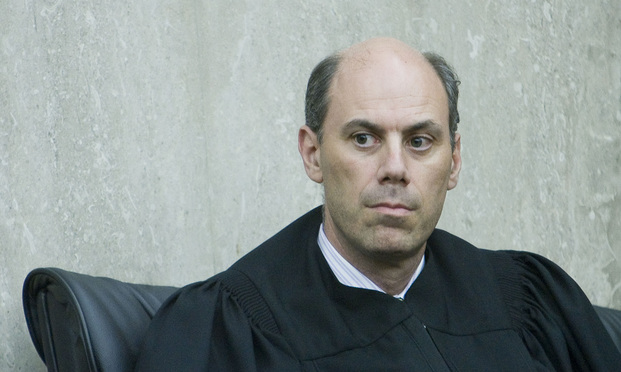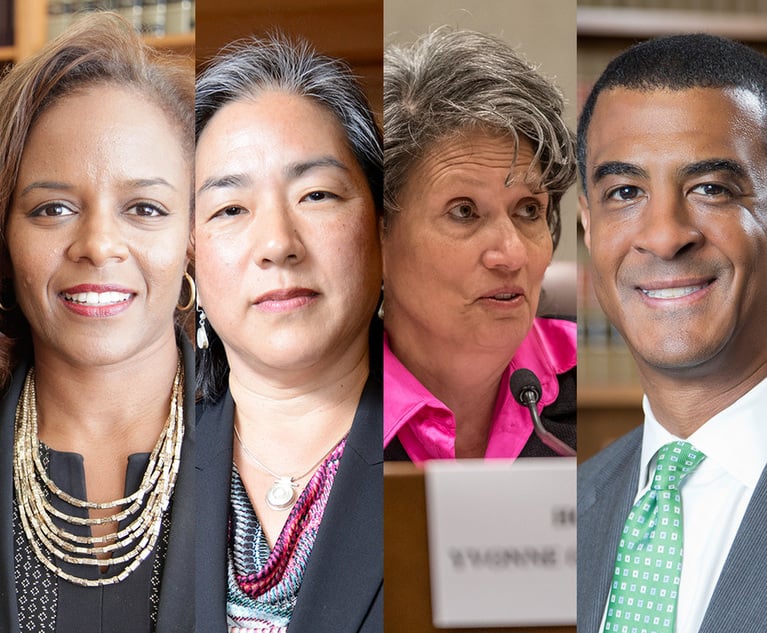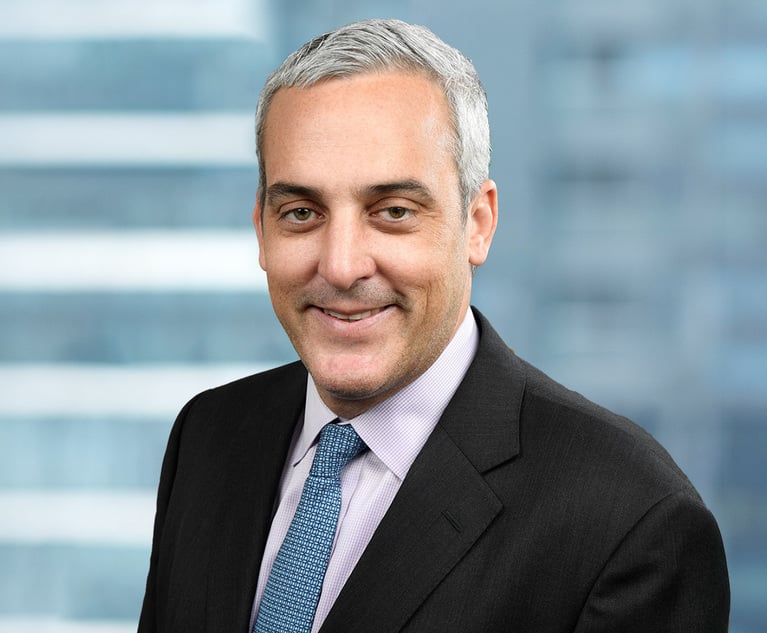Acknowledging 'Heart-Rending' Decisions on Family Separations, Judge Denies Release of Detained Immigrant Parents
U.S. District Judge James Boasberg wrote "parents face a difficult choice: release their children to sponsors for an unknown amount of time, or keep their children with them in conditions that petitioners fear are dangerous."
July 22, 2020 at 04:11 PM
4 minute read
 U.S. District Judge James Boasberg. Photo: Diego M. Radzinschi/NLJ.
U.S. District Judge James Boasberg. Photo: Diego M. Radzinschi/NLJ.
A federal trial judge in Washington, D.C., on Wednesday declined to release adult immigrants held in family detention centers, acknowledging his ruling will require parents to decide whether to separate from their children or potentially expose them to the COVID-19 virus.
U.S. District Judge James Boasberg denied the motion for a preliminary injunction seeking the release of all adults held in the family detention centers, finding that petitioners in the case hadn't reached the legal standard needed.
Boasberg's opinion comes after U.S. District Judge Dolly Gee in California last month ordered the release of children who had been in Immigration and Customs Enforcement custody for more than 20 days. However, Boasberg said his case is based on different facts than that over the immigrant children, as a long-standing settlement on the treatment of detained migrant children applies to that case but not to his.
Boasberg said that, without ruling for the release of adult immigrants at the family centers, "parents face a difficult choice: release their children to sponsors for an unknown amount of time, or keep their children with them in conditions that petitioners fear are dangerous."
"The court acknowledges that, in light of Judge Gee's order, at least some petitioners now face the heart-rending choice between handing over their children, in some cases to potentially unsuitable guardians, and keeping them in the FRCs to face an unknown virus risk. That is a painful dilemma for any parent," Boasberg wrote. "Petitioners, though, have not argued that being put to that choice somehow represents an independent violation of their constitutional rights. Instead, they contend that the prospect of separating from their children should be analyzed as irreparable harm."
However, the judge wrote that showing irreparable harm wasn't enough to order the release of the immigrants. "Because petitioners have not clearly shown that only release can redress the asserted violation of their due-process rights, the court must deny their motion," Boasberg wrote.
A number of attorneys are involved in the case, including lawyers with the groups RAICES and the Rapid Defense Network, and individual immigration attorney Amy Maldonado. Morgan, Lewis & Bockius lawyers are also doing pro bono work on the litigation; Susan Baker Manning, the firm's senior pro bono trial lawyer, argued for the injunction in a hearing last week.
Boasberg wrote that Immigration and Custom Enforcement has implemented a number of policies to address the virus in its centers, which attorneys for the detained immigrant families argue have not been sufficiently enforced to keep the detainees safe.
"In sum, it seems fair to say that ICE has taken many steps to prevent the spread of COVID-19 at the three FRCs, including releasing two-thirds of detainees and adopting CDC guidance regarding screening, cohorting, frequent disinfecting, masking, and social distancing," the judge wrote. "It also seems fair to say that the agency, while likely trending in the right direction, continues to fall short of full compliance with its policies in practice."
However, Boasberg said that even if he ruled the immigrant families would be irreparably harmed by their continued detention, "they have not met their burden to clearly demonstrate that nothing short of wholesale release—the only remedy petitioners seek at this point—can redress their injuries."
The judge noted that attorneys for the families could have sought other court orders, such as one requiring ICE to conduct more thorough contact tracing for the virus or to test staff in-house.
"At bottom, then, ordering petitioners' release now would run contrary to the principle that a 'district court should approach issuance of injunctive orders with the usual caution,' and 'exercise its discretion if appropriate by giving prison officials time to rectify the situation before issuing an injunction' at all, let alone one ordering blanket release," Boasberg wrote.
Read more:
Trump's Latest Census Move Poised to Pull In Attorneys From Citizenship Question Challenge
Immigration Judges Sue DOJ, Alleging Unconstitutional Gag on Speech
This content has been archived. It is available through our partners, LexisNexis® and Bloomberg Law.
To view this content, please continue to their sites.
Not a Lexis Subscriber?
Subscribe Now
Not a Bloomberg Law Subscriber?
Subscribe Now
NOT FOR REPRINT
© 2025 ALM Global, LLC, All Rights Reserved. Request academic re-use from www.copyright.com. All other uses, submit a request to [email protected]. For more information visit Asset & Logo Licensing.
You Might Like
View All
‘Listen, Listen, Listen’: Practice Tips From Judges in the Oakland Federal Courthouse

Judge Accuses Trump of Constitutional End Run, Blocks Citizenship Order
3 minute read
Hogan Lovells, Jenner & Block Challenge Trump EOs Impacting Gender-Affirming Care
3 minute read
Latham Adds Former Treasury Department Lawyer for Cross-Border Deal Guidance
2 minute readLaw Firms Mentioned
Trending Stories
Who Got The Work
J. Brugh Lower of Gibbons has entered an appearance for industrial equipment supplier Devco Corporation in a pending trademark infringement lawsuit. The suit, accusing the defendant of selling knock-off Graco products, was filed Dec. 18 in New Jersey District Court by Rivkin Radler on behalf of Graco Inc. and Graco Minnesota. The case, assigned to U.S. District Judge Zahid N. Quraishi, is 3:24-cv-11294, Graco Inc. et al v. Devco Corporation.
Who Got The Work
Rebecca Maller-Stein and Kent A. Yalowitz of Arnold & Porter Kaye Scholer have entered their appearances for Hanaco Venture Capital and its executives, Lior Prosor and David Frankel, in a pending securities lawsuit. The action, filed on Dec. 24 in New York Southern District Court by Zell, Aron & Co. on behalf of Goldeneye Advisors, accuses the defendants of negligently and fraudulently managing the plaintiff's $1 million investment. The case, assigned to U.S. District Judge Vernon S. Broderick, is 1:24-cv-09918, Goldeneye Advisors, LLC v. Hanaco Venture Capital, Ltd. et al.
Who Got The Work
Attorneys from A&O Shearman has stepped in as defense counsel for Toronto-Dominion Bank and other defendants in a pending securities class action. The suit, filed Dec. 11 in New York Southern District Court by Bleichmar Fonti & Auld, accuses the defendants of concealing the bank's 'pervasive' deficiencies in regards to its compliance with the Bank Secrecy Act and the quality of its anti-money laundering controls. The case, assigned to U.S. District Judge Arun Subramanian, is 1:24-cv-09445, Gonzalez v. The Toronto-Dominion Bank et al.
Who Got The Work
Crown Castle International, a Pennsylvania company providing shared communications infrastructure, has turned to Luke D. Wolf of Gordon Rees Scully Mansukhani to fend off a pending breach-of-contract lawsuit. The court action, filed Nov. 25 in Michigan Eastern District Court by Hooper Hathaway PC on behalf of The Town Residences LLC, accuses Crown Castle of failing to transfer approximately $30,000 in utility payments from T-Mobile in breach of a roof-top lease and assignment agreement. The case, assigned to U.S. District Judge Susan K. Declercq, is 2:24-cv-13131, The Town Residences LLC v. T-Mobile US, Inc. et al.
Who Got The Work
Wilfred P. Coronato and Daniel M. Schwartz of McCarter & English have stepped in as defense counsel to Electrolux Home Products Inc. in a pending product liability lawsuit. The court action, filed Nov. 26 in New York Eastern District Court by Poulos Lopiccolo PC and Nagel Rice LLP on behalf of David Stern, alleges that the defendant's refrigerators’ drawers and shelving repeatedly break and fall apart within months after purchase. The case, assigned to U.S. District Judge Joan M. Azrack, is 2:24-cv-08204, Stern v. Electrolux Home Products, Inc.
Featured Firms
Law Offices of Gary Martin Hays & Associates, P.C.
(470) 294-1674
Law Offices of Mark E. Salomone
(857) 444-6468
Smith & Hassler
(713) 739-1250






